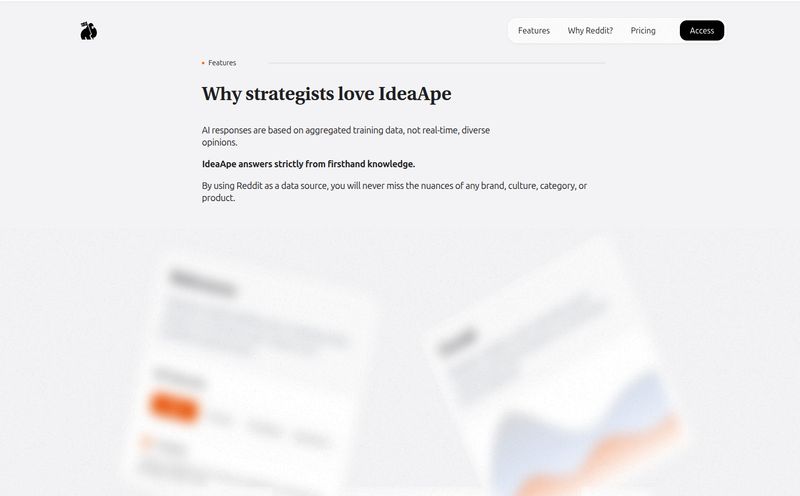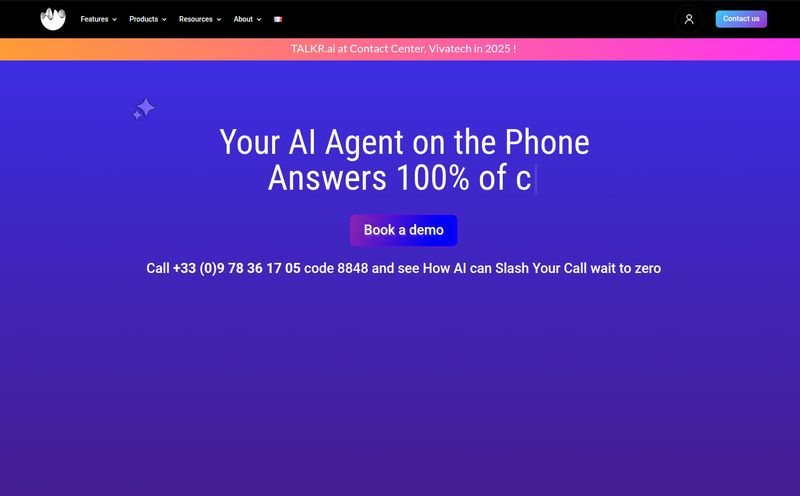If you run a digital product, your tech stack probably looks less like a streamlined machine and more like a Frankenstein's monster held together with duct tape, Zapier automations, and pure hope. You've got your support desk over here, your community forum in another tab, your docs living on some forgotten subdomain, and your product roadmap is probably a Trello board that only three people understand. It’s a mess.
We've all been there. I've personally managed projects where the customer journey felt like a scavenger hunt across five different platforms just to report a bug. It’s exhausting for users and a nightmare for your team to manage. So, whenever a tool comes along promising to be the “all-in-one” solution, my inner cynic raises an eyebrow. I've seen a million of 'em. But every now and then, one pops up that actually makes me lean in a little closer. Today, that tool is Serwell.
Their pitch is simple and bold: one tool to handle your product's support, community, feedback, updates, and documentation. Can it really pull it off? Let’s find out.
What Exactly is Serwell? Breaking Down the Pitch
At its core, Serwell wants to unify all your customer-facing operations into a single, cohesive workspace. Think about the monthly subscriptions you're paying right now. Maybe a fee for a tool like Zendesk or Help Scout for tickets, another for Discourse or Circle for community, a third for Canny or Upvoty for feedback and roadmapping, and maybe even a fourth for GitBook or ReadMe for your documentation. It adds up, not just in cost, but in cognitive load.
Serwell’s proposition is to replace that fragmented stack. It aims to be the central nervous system for your product, where conversations happen, feedback is collected, support is given, and knowledge is shared. A single source of truth. Its a pretty ambitious goal, but if they get it right, the benefits for both the company and the customer are massive.
The Core Features That Actually Matter
An “all-in-one” platform is only as good as its individual parts. If the features are half-baked, you just end up with one mediocre tool instead of several great ones. So, I took a look at what Serwell is bringing to the table.
Building a Real Community (Not Just a Forum)
The platform offers a space for discussions, Q&A, and updates. This is table stakes for any community tool, but the magic is in the integration. When a user asks a question that reveals a flaw in your documentation, you can update it right there. When a discussion sparks a brilliant feature idea, you can funnel it directly into your feedback system. It’s about creating a living ecosystem around your product, not just a static place for people to post and ghost. You're trying to foster a real connection, and having everything in one spot removes a lot of friction.

Visit Serwell
From Customer Whispers to a Public Roadmap
Okay, this is one of the features that got my attention. Serwell lets you process customer feedback and then visualizes it with an auto-generated roadmap. Anyone who has spent hours manually updating a public roadmap knows what a game-changer this is. It’s tedious work that often gets forgotten, leading to a stale roadmap that erodes customer trust.
By automating this, you're not just saving time; you're creating a transparent feedback loop. Customers see their suggestions being acknowledged and prioritized. They feel heard. That's how you build loyalty that a marketing campaign could only dream of.
Documentation That People Can Actually Find
Here’s where my SEO brain gets excited. Serwell explicitly states: “SEO is your customer's best friend.” Hallelujah. I can't tell you how many amazing products have documentation that is completely invisible to Google. It's a massive, missed opportunity for organic traffic and self-service support.
Most documentation platforms are built for writing, not for ranking. The fact that Serwell is baking SEO into its documentation feature from the ground up is a huge green flag for me. Good docs reduce support tickets and can be a powerful top-of-funnel traffic driver. If your help articles about a specific feature start ranking, you're not just helping existing customers; you're attracting new ones who are searching for that exact solution.
The AI Elephant in the Room
In today's market, you can't swing a cat without hitting a dozen tools that claim to be “AI-powered.” Serwell makes a gutsy claim: “Not another AI wrapper.” I appreciate the self-awareness. They mention an AI-powered widget you can embed on any site and “smart suggestions” to help consolidate information. This could mean anything from AI-assisted ticket responses to summarizing feedback threads or suggesting relevant doc articles.
While the specifics are a bit vague in the provided material, the potential is clear. An AI that genuinely understands your entire product ecosystem—docs, feedback, and past support tickets—could be incredibly powerful. Imagine an AI assistant that can give a customer a nuanced answer based on a combination of official docs and a community discussion thread. That's a step beyond most of the simple chatbots out there.
My Honest Take – The Good and The… Less Good
No tool is perfect, right? After looking through what Serwell offers, here’s my gut reaction.
On the bright side, the unified approach is a massive win. The thought of ditching three or four subscriptions for one is appealing, not just for my wallet but for my sanity. The focus on practical, time-saving features like the auto-generated roadmap and SEO-friendly docs shows they understand the real pain points of running a product. And the ability to use your own domain is crucial for branding and maintaining a professional appearance.
However, there are a couple of things that give me pause. The biggest question mark is the pricing, which isn’t publicly available. This often means it’s geared towards enterprise clients with big budgets, or the pricing model simply isn't finalized. I always prefer transparent pricing. Also, while the AI promises are exciting, they are still a bit light on details. The proof, as they say, will be in the pudding. Finally, any all-in-one tool can require a bit of a learning curve and initial setup to get just right.
So, Who is Serwell Really For?
Based on its feature set, Serwell seems perfectly positioned for early-to-mid-stage SaaS companies, indie developers, and product teams who are feeling the growing pains of a fragmented toolset. If you're currently managing community, support, and docs with a handful of disconnected tools and are looking to simplify, Serwell should absolutely be on your radar.
Is it for a massive enterprise that already has a decade-invested, deeply integrated Salesforce ecosystem? Probably not. Those companies have different needs and are often slower to change. But for the agile, modern product team that wants to move fast and keep everything under one roof, this looks like a very compelling option.
The Final Verdict: Is Serwell Worth a Shot?
I started out as a hopeful cynic, and I'm ending as a cautious optimist. Serwell is tackling a very real, very annoying problem. The chaos of tool sprawl is a silent productivity killer for so many companies. The idea of a single, smart platform to manage the entire customer and community lifecycle is, frankly, the dream.
The success of Serwell will ultimately depend on three things: how well the individual features are executed, how intuitive the platform is to use, and a pricing structure that makes sense for its target audience. But the vision is right. They are focusing on the right problems, and if they nail the execution, Serwell could easily become the go-to “perfect addon” they claim to be. It's one I'll be watching closely.
Your Questions About Serwell Answered
What is Serwell in simple terms?
Serwell is an all-in-one software platform designed for digital products. It combines community forums, a customer support ticket system, a feedback and public roadmap tool, and product documentation into a single, unified workspace.
How does Serwell help with SEO?
The documentation feature within Serwell is built to be SEO-optimized. This means your help articles, guides, and other documentation are more likely to be discovered by search engines like Google, driving organic traffic and helping customers find answers on their own.
Can I use my own domain with Serwell?
Yes, Serwell allows you to host your entire workspace on your own custom domain (e.g., support.yourcompany.com). This is great for maintaining brand consistency and trust with your users.
Is Serwell just another AI chatbot?
Serwell positions its AI as more than just a standard chatbot. It claims its AI is not an “AI wrapper” and is designed to provide smart suggestions by consolidating information from your docs, community discussions, and feedback, offering a more context-aware assistance.
What is the pricing for Serwell?
As of this writing, Serwell has not made its pricing information public on its website. You would likely need to contact their team directly or sign up to get details on their plans and costs.
Does Serwell replace tools like Zendesk or Canny?
In theory, yes. Serwell aims to consolidate the core functions of separate tools for support (like Zendesk), community (like Discourse), and feedback/roadmapping (like Canny) into one platform, potentially replacing the need for multiple subscriptions.
Reference and Sources
Primary analysis based on the official Serwell website: serwell.io (Note: This is a placeholder URL as the exact one wasn't provided).
Contextual comparison to common SaaS tools like Canny for feedback and GitBook for documentation.



